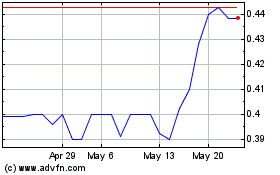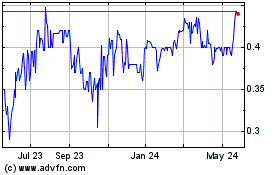Greek Banks Need up to $15.8 Billion
02 November 2015 - 12:20PM
Dow Jones News
ATHENS—Greece's top four lenders will need to inject up to €14.4
billion ($15.8 billion) in fresh funds to strengthen their capital
base, according to the results of a health check performed by the
European Central Bank released on Saturday.
The amount, which was determined by an examination of lenders
National Bank of Greece (NBG) SA, Piraeus Bank SA, Eurobank
Ergasias SA and Alpha Bank AS., is in line with market
expectations. The banks are now required to say how they plan to
raise this capital by November 6.
The checks were carried out using baseline and more-adverse
scenarios for the course of the Greek economy up until the end of
2017 to project possible credit losses.
Under the baseline scenario, the banks will need €4.4 billion,
while under the adverse scenario, the capital shortfall reaches
€14.4 billion, the ECB said.
"Covering the shortfalls by raising capital will result in the
creation of prudential buffers at the four Greek banks, which will
improve the resilience of their balance sheets and their capacity
to withstand potential adverse macroeconomic shocks," the ECB said
in a statement.
This will be the third capital increase for the country's
battered lenders since Greece's debt crisis erupted in 2010, and it
must be completed by the end of the year. From January, European
rules on bank recapitalization potentially require bank depositors
to take a hit.
The country's state-owned recapitalization fund, the Hellenic
Financial Stability Fund, will cover any capital gap beyond the
baseline scenario if it cannot be raised in the market, by buying a
mix of new shares and contingent convertible bonds that banks will
issue. The new shares will have full voting rights.
A breakdown of figures shows Piraeus Bank, the country's
second-largest lender, has the biggest recapitalization
requirement, needing to meet a shortfall of €4.93 billion.
Eurobank, the only lender that isn't majority owned by the Greek
state, has the smallest need at €2.12 billion. Alpha Bank needs
€2.74 billion in fresh capital, while the country's largest lender
NBG requires €4.60 billion.
According to Greece's third bailout agreement reached in
mid-July with international creditors, eurozone countries and the
International Monetary Fund, some €25 billion of public money was
earmarked to recapitalize Greece's banks. The framework for the
bank recapitalization got the backing of the majority Greece's
lawmakers on Saturday.
The banks are likely to raise these amounts, according to
analysts, as they wrestle with a massive pile of nonperforming
loans, a key challenge for the sector. With the economy slipping
back into recession this year, albeit at a milder rate than
initially expected, about one in two loans held by Greek banks are
nonperforming.
The management of those loans is also proving to be a major
obstacle in continuing talks between Greece and international
creditors over the country's next tranche of aid, raising policy
issues on how the banks should recover their outstanding loans.
They also pose problems for helping to finance the recovery.
With funds tied up in bad loans, Greek banks have been severely
restricted in their ability to provide fresh finance to companies
and households. Demand for credit has also plummeted amid the
downturn that wiped about a quarter of the size of the economy
since 2010.
"The next big challenge for [Greek] banks will be to get back to
normal," said Ricardo Garcia, European Economist at UBS Wealth
Management. "Now everything depends on the first review; despite
some hiccups, overall things are moving in the right direction,
obviously helped by the better than expected economy."
Provisions taken for bad loans continue to take a heavy toll on
earnings, according to the latest batch of profit figures released
by Greek lenders on Saturday. Banks had held off from revealing
these figures until the completion of the asset review performed by
the ECB.
Piraeus Bank reported a net loss of €635 million for the first
nine months of the year, narrowing from a loss of €1.6 billion in
the same period a year earlier. Alpha Bank was also in the red for
January to September by €838.4 million versus a year earlier profit
of €129.3 million. NBG unveiled second quarter figures showing a
loss of €1.6 billion, which compares with a €159 million loss in
the first three months of the year.
Other problems faced by the sector include restoring liquidity
conditions for the domestic banks that have been relying heavily on
emergency funding from the ECB. Lenders suffered a major flight of
deposits during the six-month-long negotiations between the Greek
government and the country's international creditors, that prompted
the introduction of capital controls over the summer.
In a bid to finally restore confidence in the Greek financial
system, regulators set a high bar for the stress tests this time
round.
The banks are required to have a common-equity Tier 1 ratio of
9.5% after the baseline stress and 8% after the extreme stress.
That is much more than the respective 8% and 5.5% hurdles in the
previous health check up.
Write to Stelios Bouras at stelios.bouras@wsj.com
Subscribe to WSJ: http://online.wsj.com?mod=djnwires
(END) Dow Jones Newswires
November 01, 2015 20:05 ET (01:05 GMT)
Copyright (c) 2015 Dow Jones & Company, Inc.
Alpha Services (PK) (USOTC:ALBKY)
Historical Stock Chart
From Dec 2024 to Jan 2025

Alpha Services (PK) (USOTC:ALBKY)
Historical Stock Chart
From Jan 2024 to Jan 2025
